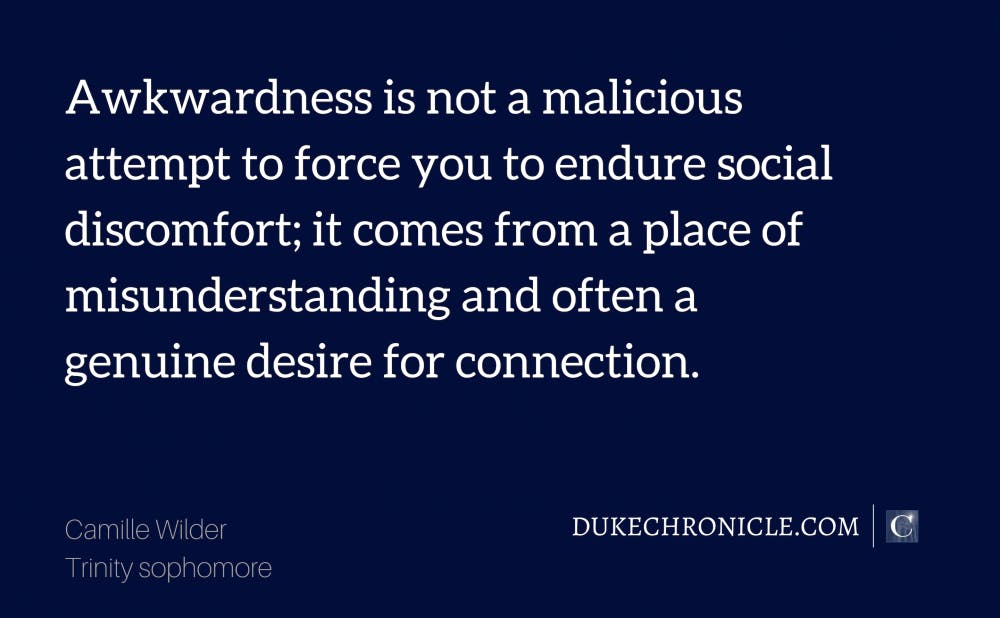I have written about introversion and social anxiety, but now it’s time to talk about their dear friend: awkwardness.
This newcomer is a little harder to define. Some people are consistently awkward and earn themselves a reputation for spreading social discomfort. And all of us have committed some social faux-pas at some time or other. Yet, what is awkward? Is it a word dredged up from our middle school years, when kids declared themselves awkward (they were usually not kids who were genuinely awkward) and people like me glared at them for stealing our rightful title and failing to understand the pain accompanying it?
Ty Tashiro, a psychology researcher, examines the causes of awkwardness in his book Awkward: The Science of Why We’re Socially Awkward and Why That’s Awesome. Tashiro explains that awkward people fail to meet normal social expectations. They often don’t recognize facial or other social cues and can’t grasp the flow of a conversation. Awkward people almost always know that they’re being awkward, but are unable to understand why or how to fix it.
Tashiro has found that a number of correlating traits can predict awkwardness in an individual. They are usually people of high intellect and low self-control. Awkward people view the world with a spotlighted focus and see things differently than others. They often have a few passions in which they are deeply invested and prone to talk a lot about. They are well-adjusted to repetitive tasks and do not tire of them. This is where the stereotype of the awkward intellectual stems.
By themselves, these characteristics are not bad. In fact, they are quite useful in someone conducting scientific research, for instance. Nonetheless, they don’t transfer well to social situations. Awkward people’s spotlighted focus means that they can’t get an overall understanding of a conversation. Bits and pieces stand out to them; this enables awkward people to sometimes be very funny and reimagine things in a novel light, but usually results in social discomfort. Awkward people may not realize they are boring others with talk of their love for chemistry or philosophy, yet easily grow disinterested when topics veer towards sports or pop culture. On top of this, many awkward people have social anxiety or are introverted, and thus are not inclined to explore new social scenes. It’s hard to know feel as though everyone else in the world got a manual in middle school for how to act, but you somehow didn’t get a copy.
Awkwardness is nuanced—most people are not awkward all the time, just in new situations or around certain types of people. Awkward people are usually not hard to interact with once you get to know them, but are dismissed based on their off-putting behaviors. Awkward people are well-intentioned, but clueless as to how they can stop being offensive in dinner party circles or meet-and-greets.
There are many times at Duke where everyone is prone to some social unrest. SLG rush, O-Week and small talk in West Union come to mind. These experiences are necessary, but it quickly becomes apparent who is awkward and who is not. The rapid fire of small talk questions is draining to all involved. Some people are able to jump from small talk to deep conversations seamlessly, while others exhaust their budding acquaintances by failing to lead the conversation. I felt like I was one such individual. I had no idea how some people were so good at immediately being likeable and reading social tones.
There are plenty of charismatic people at Duke, but there are also many, many people of a more awkward bent. Being awkward is fine; there is nothing wrong with it. Despite this, navigating the world is made a bit easier when one is socially on par with their peers. Awareness of how one’s behaviors are affected by traits that create awkwardness has been helpful for me. I see when I am failing to notice social cues or when I focus in too much on certain points of talk. I understand the overarching social expectations that dictate interactions. I am not perfect at not being awkward, but I am more informed.
On the other hand, people who are not awkward should be understanding of their awkward counterparts. Awkwardness is not a malicious attempt to force you to endure social discomfort; it comes from a place of misunderstanding and often a genuine desire for connection. Many awkward people, myself included, have felt terribly about themselves because of how dismissive or unkind others were when their actions were socially incongruent.
Camille Wilder is a Trinity junior. Her column usually runs on alternate Thursdays.
Get The Chronicle straight to your inbox
Signup for our weekly newsletter. Cancel at any time.
Camille Wilder is a Trinity first-year. Her column runs on alternate Thursdays.

